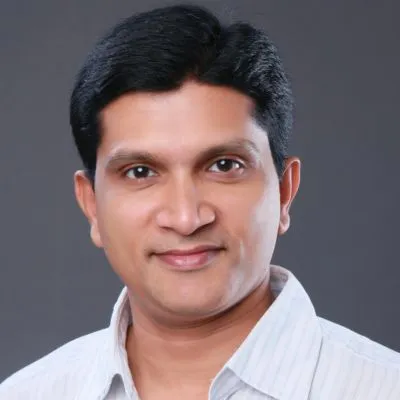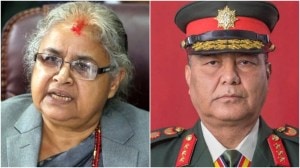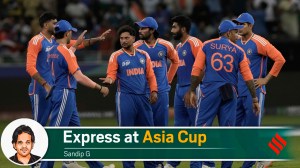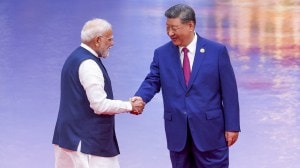Throwing open the doors of the Sabarimala temple in Kerala to women of all ages, the Supreme Court, in a 4-1 verdict Friday, ended the entry ban on women of menstruating age, saying the centuries-old custom at the shrine was not an essential religious practice and “the attribute of devotion to divinity cannot be subjected to the rigidity and stereotypes of gender”.
Four of the five judges on the Constitution Bench — Chief Justice of India Dipak Misra, Justices R F Nariman, A M Khanwilkar and D Y Chandrachud — ruled against the restriction on women while Justice Indu Malhotra gave a dissenting opinion, saying “the religious practice of restricting the entry of women between the ages of 10 to 50 years is in pursuance of an ‘essential religious practice’” and “notions of rationality cannot be invoked in matters of religion by courts”.

Also Read | SC throws open doors of Kerala’s Sabarimala temple to women: All you need to know
Story continues below this ad
The majority judgment held as unconstitutional Rule 3(b) of the Kerala Hindu Places of Public Worship (Authorisation of Entry) Rules, 1965, framed in exercise of powers conferred by Section 4 of the Kerala Hindu Places of Public Worship (Authorisation of Entry) Act, 1965. It said Ayyappa devotees do not constitute a separate religious denomination within the meaning of Article 26 of the Constitution.
Writing the order for self and Justice Khanwilkar, CJI Misra said Rule 3(b) “that stipulates exclusion of entry of women of the age group of 10 to 50 years, is a clear violation of the right of Hindu women to practise their religious beliefs which, in consequence, makes their fundamental right of religion under Article 25(1) a dead letter.”
Also Read | Sabarimala verdict: Justice Indu Malhotra dissents — Can’t invoke rationality in religion
“The right guaranteed under Article 25(1) has nothing to do with gender or, for that matter, certain physiological factors, specifically attributable to women. Women of any age group have as much right as men to visit and enter a temple in order to freely practise a religion as guaranteed under Article 25(1),” he said.
Also Read | Full text: Supreme Court Sabarimala temple judgment
Story continues below this ad
The CJI said “the attribute of devotion to divinity cannot be subjected to the rigidity and stereotypes of gender. The dualism that persists in religion by glorifying and venerating women as goddesses on one hand and by imposing rigorous sanctions, on the other hand, in matters of devotion has to be abandoned”.
 Queue outside Sabarimala temple. (Reuters file)
Queue outside Sabarimala temple. (Reuters file)
Noting that “any relationship with the Creator is a transcendental one, crossing all socially-created artificial barriers and not a negotiated relationship bound by terms and conditions”, he said the “subversion and repression of women under the garb of biological or physiological factors cannot be given the seal of legitimacy. Any rule based on discrimination or segregation of women pertaining to biological characteristics is not only unfounded, indefensible and implausible but can also never pass the muster of Constitutionality”.
Also Read | Sabarimala verdict: CPM happy, Congress treads middle path, BJP seeks consensus
Rejecting the contention that Ayyappa devotees form a separate religious denomination, he said “in the absence of any scriptural or textual evidence, we cannot accord to the exclusionary practice followed at the Sabarimala temple the status of an essential practice of Hindu religion” and “by allowing women to enter into the Sabarimala temple for offering prayers, it cannot be imagined that the nature of Hindu religion would be fundamentally altered or changed in any manner”.
Story continues below this ad
In his concurring judgment, Justice Nariman said “the fundamental right claimed by the Thanthris and worshippers of the institution, based on custom and usage under… Article 25(1), must necessarily yield to the fundamental right of such women, as they are equally entitled to the right to practise religion, which would be meaningless unless they were allowed to enter the temple at Sabarimala to worship the idol of Lord Ayyappa. The argument that all women are not prohibited from entering the temple can be of no avail, as women between the age group of 10 to 50 are excluded completely”.
Justice Chandrachud said “the postulate of equality is that human beings are created equal… To exclude women from worship by allowing the right to worship to men is to place women in a position of subordination. The Constitution should not become an instrument for the perpetuation of patriarchy. The freedom to believe, the freedom to be a person of faith and the freedom of worship, are attributes of human liberty. Facets of that liberty find protection in Article 25. Religion then cannot become a cover to exclude and to deny the basic right to find fulfilment in worship to women.”
“To treat women as children of a lesser god is to blink at the Constitution itself,” he said, agreeing with the other three judges that it was “not an essential practice”. He said “the social exclusion of women, based on menstrual status, is a form of untouchability which is an anathema to Constitutional values. Notions of ‘purity and pollution’, which stigmatize individuals, have no place in a Constitutional order”.
Justice Indu Malhotra, in her dissenting opinion, said the the issues raised in the writ petition have far-reaching ramifications and implications, not only for the Sabarimala temple, but for all places of worship of various religions and that “in a secular polity, issues which are matters of deep religious faith and sentiment, must not ordinarily be interfered with by Courts”.
Story continues below this ad
“Permitting PILs in religious matters would open the floodgates to interlopers to question religious beliefs and practices, even if the petitioner is not a believer of a particular religion, or a worshipper of a particular shrine. The perils are even graver for religious minorities if such petitions are entertained,” she said.
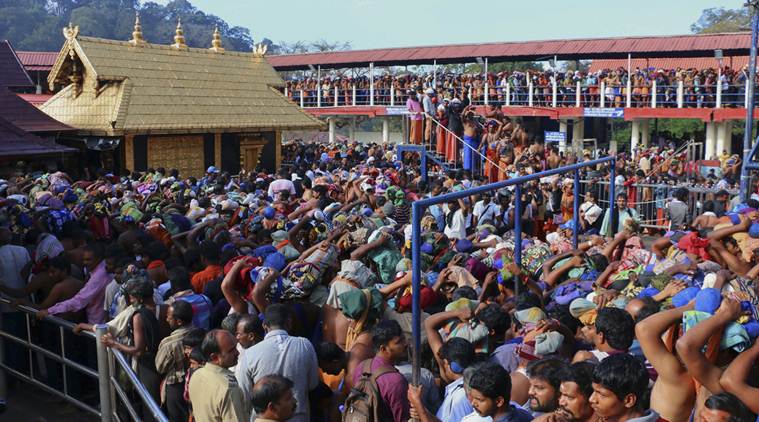 Four of the five judges on the Constitution Bench — Chief Justice of India Dipak Misra, Justices R F Nariman, A M Khanwilkar and D Y Chandrachud — ruled against the restriction on women. (AP photo/File)
Four of the five judges on the Constitution Bench — Chief Justice of India Dipak Misra, Justices R F Nariman, A M Khanwilkar and D Y Chandrachud — ruled against the restriction on women. (AP photo/File)
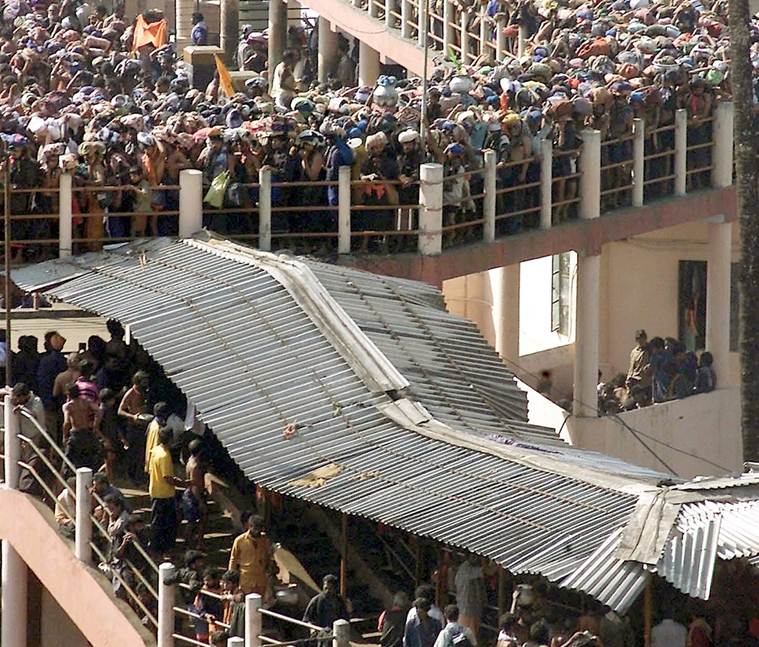 Queue outside Sabarimala temple. (Reuters file)
Queue outside Sabarimala temple. (Reuters file)